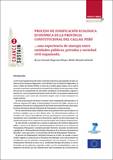|
Metropolitan authorities across the globe are facing population growth and in-migration which transcends their current planning and development capacities. As a result, projections predict a near doubling of the global slum population from 1990 to 2020 (Pieterse 2008). Slums and informal dwellings across the world do not represent a homogeneous phenomenon. They display varying levels of regularity and legality, and are therefore usually defined according to their access to improved water and sanitation, whether their inhabitants enjoy sufficient living area and, finally, their (lack of) security of tenure (Sutherland, Braathen et al. 2011).
As formal housing projects alone have proved insufficient in dealing with this growth, global programmes and national policies alike have started championing in situ upgrading of informal settlements. According to Huchzermeyer (2011), this can be described as an incremental approach to informal settlement upgrading where the permanent securing of tenure and rehabilitation of unsuitable land is based on “meaningful community participation”. We stress the word ‘meaningful’ here because, as we will argue, there are many allegedly participatory interventions into slums and squatter settlements which are not experienced as meaningful to those living there. When authorities use the language of participation, this creates expectations which, if not met, can lead to dissatisfaction and unrest.
Chance2Sustain Policy Brief Series - ISSN 2305-5960 |
Recent Chance2Sustain Publications |
|
|
|
|
|

